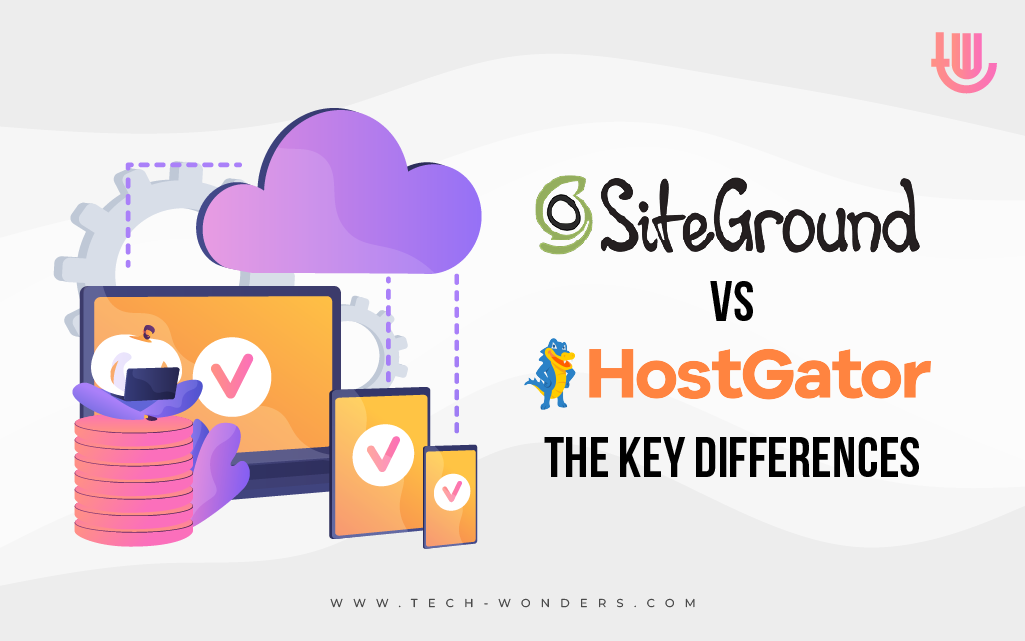
SiteGround and HostGator are two of the most popular web hosting services on the market. They are both secure, reliable, and scalable, and offer a wide range of features that can accommodate any size website.
However, these two hosting services have some key differences you should be aware of before choosing one for your website. This article outlines them for you, so you can make an informed decision about which is the best fit for your needs.
Ease of Use
Siteground has an attractive and user-friendly control panel that is easy to navigate. It has a modern, intuitive design that makes it simple to find the tools and features you need.
You can create user profiles with certain permissions, which is helpful if you have a team working on your website. Overall, it is one of the most user-friendly control panels on the market.
Hostgator’s control panel is also intuitive, sleek, and easy to use. However, there are upsells, constant ads, and paid add-ons that make it feel a bit cluttered.
Hostgator does have an advantage when it comes to user profiles. You can create an unlimited number of user accounts with different permissions, which is ideal if you have a large team working on your website.
Winner: Both Siteground and Hostgator are easy to use, but Siteground’s control panel is more user-friendly and less cluttered.
Storage
Siteground comes with three plans, that offer, 10, 20, and 40GB of storage respectively. This makes it ideal for small to medium-sized websites. It doesn’t have a file limit, so you can upload as many files as you want. However, if you need more storage, you may need to go for a Siteground alternative.
Hostgator offers unlimited storage with all of its plans. So, no matter how large or popular your website becomes, you won’t need to worry about running out of storage space. However, there is a hidden file limit cap of 200,000 files.
Winner: Hostgator offers unlimited storage with all of its plans, making it the better choice for larger websites.
Backups
Website backup is one of the most important features a web hosting service can offer. It is essential for protecting your website from data loss, malware, and hacking attacks.
Siteground offers daily backups with all of its plans. You can also create manual backups at any time through the control panel. These backups are stored on a separate server and can be restored with just a few clicks.
Hostgator offers one weekly backup, and you will have to pay $25 if you want to restore it. This is not ideal and is a dealbreaker for many users.
Winner: Siteground is the clear winner when it comes to backups. Its daily backups and easy restoration make it a much better choice for website owners who want to protect their data.
Security
Siteground comes with a wide range of security features, including a free SSL certificate, daily malware scans, and a hack alert system. There are also some advanced security features available, including a firewall, a CDN, and DDoS protection.
You can also get a SG Site Scanner at an additional fee. This is a service that constantly scans your website for malware and vulnerabilities.
Hostgator also has a free SSL certificate and daily malware scans. However, its hack alert system is not as comprehensive as Siteground’s. Also, if you need extra file scans, you may need to pay an extra fee.
Winner: Siteground is the better choice for website security, thanks to its free comprehensive security features.
Server Locations
Server location is the physical location of the servers that host your website. It is important to choose a server location that is close to your target audience.
Siteground has data centers in Europe, Asia, Australia, and North America. This makes it a good choice for global businesses.
Hostgator also has data centers in Texas, Utah, and North America. This means that it is a good choice for businesses targeting audiences in North America.
Winner: Siteground is the better choice for businesses with a global audience.
Speed
According to Google, if your website takes more than three seconds to load, you are at risk of losing visitors. This is why website speed is so important.
Siteground has an average page loading time of around two seconds. This is thanks to its use of solid-state drives (SSD), advanced caching, and a content delivery network.
Hostgator’s page loading time is around three seconds. This is not as fast as Siteground, but it is still within the acceptable range. It also uses SSD storage, offers a CDN, and uses an array of catching tools to enhance site speed.
Winner: Both Siteground and Hostgator offer fast page loading times. However, Siteground is slightly faster, making it the better choice for businesses that want to ensure a fast user experience.
SiteGround vs HostGator: Verdict
Now that you know the differences between SiteGround and HostGator, you are probably wondering, which one is best for my needs?
The truth is, it all boils down to your specific needs. For instance, if you need unlimited storage, then HostGator is the better choice. However, if you need daily backups, then SiteGround is the better choice.
It really all comes down to what is most important to you and your business. Therefore, take some time to think about your needs before making a decision.